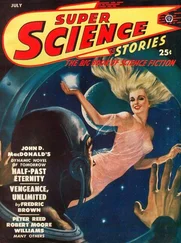She fished in her bag and found a clipping. She handed it to him.
He read: “POST AND LIMPING DISH WIN OUT. Valiant Walker Post and his skinny gal friend, heiress to the Benderson hundreds, battled their way through seventeen thousand bushes yesterday, only to collapse on the highway. Happy couple refuse to explain why her ankle was bandaged with his shirt.”
He looked at her in amazement. “What’s this? How come?”
“You’re a little thick, friend. I printed it myself. Printed it with the stuff they found in the back of Drake’s car. Drake isn’t his name. He’s a confidence man who was expanding. He didn’t buy that lake either. Both the clippings he showed you were fakes. Had his own newsprint, ink and hand printing set. Nobody ever heard of a Victor Hessler. He just wanted to get his hooks into you so he could use you. He confessed to the whole works. The three of them killed a ‘patient’ out West somewhere, and moved here. He found the lake and took over. Bold guy, I’d say.”
“How did he know so much about me?”
“He said he got some information from your landlady. She apparently was annoyed at you. Didn’t you wonder how he knew you had a checkbook? Didn’t you wonder why, if the police had a picture of you it wasn’t printed in the paper, instead of your description? You need somebody to take care of you, Walker. You shouldn’t be around loose. You might hurt yourself.”
“How about Strane? I didn’t exactly mean to kill him, but I did.”
“The police don’t say that they’d exactly hang you. I heard one of them say something about an award of merit or a pension. You probably saved a western state a few execution expenses. They say you’ll be out this afternoon sometime. Oh, and by the way, we’re not to mention the Burke man. He and his lady were smuggled out to go separate ways. I saw her. She was wearing a handsome purple eye and an injured expression.”
She stopped and he looked at her. She had been gay and bright and glad to tell him that he would be free. She looked at him steadily and her smile faded.
She looked away and said, “And you’ll come back in a year?”
He waited for long seconds. He wanted to be certain. At last he said quietly, “I’ll be back.”
She stood up and walked quietly out of the room that was no longer a cell. She left the door ajar.
Secret Stain
(“Heritage of Hate,” Black Mask , July 1949)
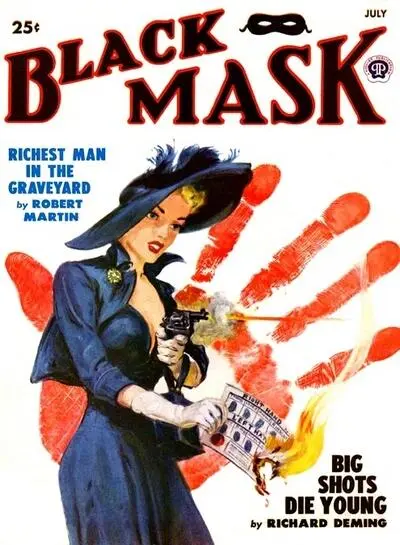
The girl was young with a dancer’s body and a dress that clung expensively and just right. She was the hostess and knew everyone around her. He stood over near the draperies drawn across the windows against the dusk, watching her drink heavily, hearing the dissonant tautness of her voice — and he thought how incredible it was that she had given up all the things she could have become in order to marry Gus Lench, in order to have this Westchester home. And in this long room softly lighted, here in the mechanical babble of the cocktail party, she had become the assistant executioner.
He saw that murder did not become her. He saw that her mouth was too wide and too thicky-shiny. The many drinks did nothing to glaze the faintly feral alertness of her eyes.
Of course, the others did not know, and thus they did not feel the strain of it.
Most of the guests had come up from the city. Lawrence Hask stood near the draperies and took his eyes from Gail Lench for a moment to look around the room. Often he thought that these cocktail party guests had no reality, that they were rented for such affairs, wound up by a key inserted in the small of their backs. Men with gestures, and pouched eyes and deft conversation. Women who posed, holding one stance, moving slowly to another, with sleepy words of idle warmth.
At the far end of the room a sallow man played muted and professional show tunes at a baby grand. A girl, her face putty overlaid with glaze, stood raptly behind him and foolishly massaged the nape of his lean neck as he played. He seemed not to know she was there.
He replaced his empty glass on a tray, took a fresh drink. It seemed so obvious, the tension in the air, that he wondered that Carter didn’t feel it. Halfway down the room August Lench sat on a couch with a puffy little blonde. She giggled too much. August Lench, at sixty, carried two hundred pounds on his five-foot-four frame. His naked skull was marked with discolored spots. He appeared to be the incarnation of evil, and this in itself was his greatest business advantage, people saying, “Of course, no man who looks like that could be as wicked as he looks.”
And, of course, Lawrence Hask knew that Lench was exactly what he seemed to be.
Carter, carefully marked for death, stood in the group near Gail. She favored him with her most animated moments, with the huskiest of her strained laughter. Lawrence saw Lench glance over from time to time, his eyes flickering across Carter’s broad back, and Lawrence wondered that Carter, through the well-tailored suit, could not feel the icy cold of those casual glances from Lench’s colorless little eyes.
The room was smoke, and rustle-hum of conversation. The room held the pale flower-stink of gin. The room was suggestion and counter-suggestion. And, of course, the room was death.
Lawrence Hask stood, tall and lean and detached, a half smile on his lips, a casual, cocktail party smile, and he caught the gesture when Gail self-consciously touched her hand to her dark hair.
She took three steps out into the room and said, “Everybody! Your attention! With this party the House of Lench inaugurates the all-weather pool. As it’s a surprise and we knew you wouldn’t come prepared, we’ve laid in a stock of swim togs for guys and gals. Come along, now. The pool is in the new pavilion. Steam-heated, my dears. With bar. Men’s dressing room on the left, women on the right.”
Lawrence quickly drained his drink. This would very probably be it. He glanced over and saw Carter’s bodyguard, Lochard, pull himself together with an effort. The tall redhead clung to his arm. Lawrence knew that she would not be in on it, that, under pressure, she would merely say that she had been told to be nice to Lochard as he was a friend of Mr. Carter.
The pool was large, oval, the water in it placid and green. The pavilion had glass walls, steamed with the thick heat. The chill glasses on the tiny bar were beaded with moisture.
Hask knew that it was in a style that Lench would well afford, and only Carter could more easily afford. With Carter out of the way, it would be that much easier for Lench to afford it, because then Lench would not only receive his own cut, he would get Carter’s also. And that made a proper motive for murder. Lawrence guessed that Gail’s few improbable ad-lib courtesies to Carter would figure very small in Lench’s mind, if at all. Lench had arranged Carter’s murder with care, and, in the mind of Lench, it would have the same importance as the purchase of a new gross of stitching machines to be planted in Brooklyn lofts to enlarge the daily issue of treasury pool tickets, thus enlarging Lench’s personal cut.
As Lawrence Hask followed the other men into the dressing rooms, as he selected a garish pair of trunks, he wondered what Gus Lench would say if he knew that Lawrence Hask not only knew about the pending murder but planned to prevent it.
In a way, Lench’s weakest point was his inability to think of any motive beyond profit. Given another few days, Lawrence could have ferreted out, from Gail, the precise method. But there hadn’t been time.
If Lench had thought of there being any motive except profit, he might have been a bit more wary on the day that the three route men had brought Hask, bleeding, to Lench’s office.
Читать дальше
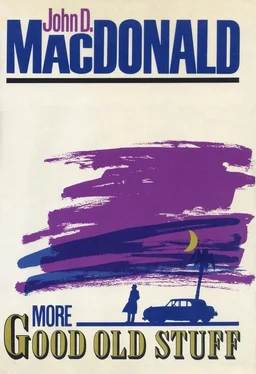

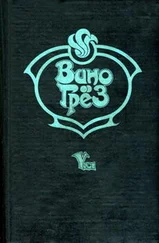
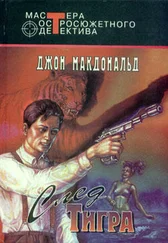
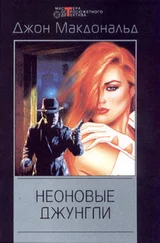

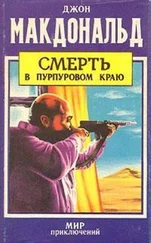



![Джон Макдональд - Wine of the Dreamers [= Planet of the Dreamers]](/books/430039/dzhon-makdonald-wine-of-the-dreamers-planet-of-thumb.webp)

